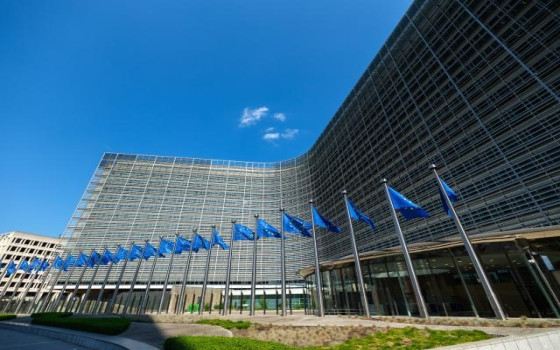
Digital Changes Adopted by the Nine Candidate Countries for EU Membership to Align with EU Standards

- Europe and Arabs
- Tuesday , 4 November 2025 9:40 AM GMT
Brussels: Europe and the Arab World
To join the European Union, countries must align their systems with the EU's legislative and regulatory framework—the set of laws, regulations, standards, and policies adopted by the bloc.
This includes technology and digital infrastructure requirements, such as digital wallets and online government services, as well as cybersecurity defenses that are in line with the rest of the EU and regulations governing emerging technologies like artificial intelligence (AI).
Ahead of the EU enlargement summit, Euronews, the European news network based in Brussels, published a report examining how candidate countries are progressing in certain technological areas to meet EU standards.
Digital Wallets
In 2024, the EU adopted a resolution requiring member states to establish digital wallets within two years, as part of a broader package of e-services for their citizens.
Digital wallets enable EU citizens to access their digital identities to verify their identity, store, share, and sign important documents.
These wallets must comply with all EU data exchange rules and respect privacy under the General Data Protection Regulation (GDPR). Several candidate countries, including Bosnia and Herzegovina, North Macedonia, and Moldova, are testing digital wallet applications. By 2026, Ukraine, Serbia, and Albania will have digital wallets.
In Moldova's case, the wallet is being built with EU support through a program called "We Build Consortium." The country is creating a document tab within its e-government platform, EVO, to serve as the wallet, and is also testing an electronic signature application within the app.
By the end of the year, North Macedonia says it will have a "super app" called "m.Uslugi," which will also provide its citizens with deadline reminders, a digital email, and a place to store all their documents.
Meanwhile, Albanian media reported that Prime Minister Edi Rama said a digital identity will be developed by a state-owned company called Identitek and will allow citizens to use their government IDs on phones or computers as multifunctional wallets.
Some candidate countries, such as Turkey, have e-government services that cover most of the population, but they lack a documented plan for how they will meet EU standards. Cybersecurity
Another area where countries must comply with various cybersecurity regulations is the Network and Information Systems Security Directive (NIS), which standardizes its application across 18 sectors.
Among the requirements is that each country develop a national cybersecurity strategy, along with a list of its essential services that require additional protection in various sectors, including energy, transport, healthcare, finance, and digital infrastructure.
Under the EU Cybersecurity Strategy, countries must also be prepared to provide threat intelligence and assistance to other EU members in the event of a major attack.
This was demonstrated in Ukraine through a 2023 agreement between its Cybersecurity Coordination Centre and the European Union Agency for Cyber Security (ENISA) to train more specialists in the field and exchange information. The EU has also established a cyber lab for the Ukrainian armed forces and signed the Tallinn Mechanism initiative to support cyber capacity building in Ukraine in the short and long term.
Meanwhile, Albania, Montenegro, Turkey, Georgia, Moldova, and North Macedonia have national cybersecurity strategies that align with some, if not all, EU directives.
For example, in the area of digital governance, Moldova is also working to join ENISA’s planned cyber reserve, a group of trusted providers across the bloc that will be able to respond to a major or large-scale cyberattack.
Montenegro’s national strategy includes the establishment of a cybersecurity capacity-building center for the Western Balkans region in 2022, as a joint project with French and Slovenian authorities.
However, not all of these strategies are fully compliant with EU legislation. Turkey’s strategy has been criticized by the opposition in the country, which, according to local media, argues that it could enable widespread surveillance and restrictions on freedom of expression. Serbia is working on a cybercrime strategy with EU support to combat digital crime and digital evidence.
Emerging Technologies
The EU’s latest legislation is the Artificial Intelligence Act, which establishes a risk-based regulatory framework for AI systems.
AI used in areas such as education, employment, healthcare, and law enforcement will have to meet stringent requirements regarding safety, transparency, and data privacy.
Countries will also have to establish national authorities to ensure compliance with the rules and to guarantee that any AI system they develop is auditable and traceable.
Albania, Moldova, Serbia, and Ukraine all have AI strategies, but no legislation has yet been adopted.
Albania’s strategy aims to use AI in the energy sector and public procurement, and to combat tax evasion, according to local media reports.
The minister, Deila, is responsible for all decisions related to public tenders, which Prime Minister Edi Rama said would make them “100 percent corruption-free.” But critics of the AI minister told Euronews that the model, like other AI models, may contain biases that could affect its outcomes.
In addition to the national strategy, Serbia has developed ethical guidelines for AI adoption and established a specialized council working on formal AI legislation for the country.












No Comments Found